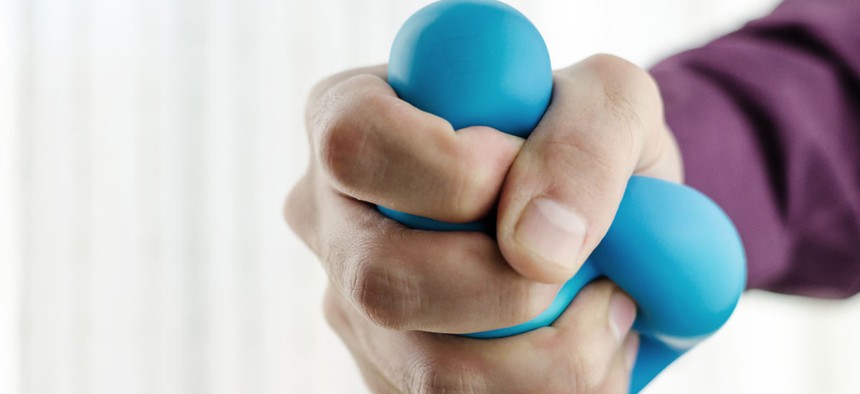
A stress ball can help. Focus and Blur/Shutterstock.com
Neuroscience Shows That Stress Can Actually Make You Better at Your Job
Too little or too much of it, and your brain underperforms. But the right amount can help you do your best.
Helen felt a thumping in her chest and a knot of tension in her stomach. She had been dreading this meeting—but she simply had to confront her boss about her impossible workload.
Her boss was not a man suffused with empathy and compassion for his underlings. She feared the consequences of speaking up. But the unremitting pressure of work had left her little time for herself.
As the 10am meeting time approached, a stream of panicky thoughts flooded through her mind. What if he flew into a rage? What if she got fired? What would she tell her family?
But with five minutes to go before the meeting, Helen remembered: Stress like this could actually be a form of energy that would help her get what she wanted. Here is what she did, and why.
She took a deep breath
Helen closed her eyes and breathed in slowly to the count of five, then out to the count of five. She let her attention slowly follow her breath, in and out. She repeated this cycle two more times.
She felt different right away. Why? Because she had changed the chemistry of her brain, and, in particular, the activity of a critical chemical messenger called norepinephrine (or noradrenaline). Norepipephrine is a key part of the fight-or-flight system responsible for that super-alert, edgy mental state that is part of the stress response.
This neurotransmitter is produced in a tiny part of the brain called the locus ceruleus, which has a remarkable property: It is highly sensitive to the amount of carbon dioxide in your blood. Since the way you breathe determines the carbon-dioxide levels in your blood, this means that Helen could directly affect the norepinephrine levels in her brain.
What’s more, norepinephrine has a sweet spot. Too little or too much of it, and your brain underperforms. But in its Goldilocks zone, the brain becomes synched and focused—and you perform at your best.
Top sportspeople understand the energizing power of nerves. For example, golfer Tiger Woods famously said, “The day I’m not nervous is the day I quit…That’s the greatest thing about it, just to feel that rush.”
The trick is figuring out how to get to the right level of nervousness. By slowing her breathing, Helen was able to control—in fact, use—this energy of mental arousal to pull herself to her norepinephrine sweet spot: neither too relaxed nor too tense.
She said to herself, “I feel excited”
Helen remembered another recent occasion when her heart had been racing, her stomach tight, her mouth dry, and her skin sweaty. But this was a happy memory—she had just been given an unexpected professional award at a trade show.
The bodily symptoms of excitement and stress are identical. The only way we know which emotion we are experiencing is by the context of the situation in which we experience these very general symptoms.
So Helen decided to treat her pre-meeting jitters as if they were the signs of eager anticipation. I feel excited, she told herself as she waited to meet her boss. In this way, Helen was magically changing one emotion (anxiety) into another (excitement)—simply by changing her mental context.
Just as she had controlled her brain chemistry by the way she breathed, Helen had also changed how her brain was interpreting her bodily symptoms. Research confirms (pdf) that people perform better by saying “I feel excited” as opposed to saying “I feel anxious.” In fact, the former improves performance even better than “I feel calm.” These last three words don’t work so well because the bodily symptoms of calmness—for example, a slow heart rate, relaxed muscles, and dry skin—are the opposite of those of anxiety. Because of this, it is much harder to “trick” the brain into changing its interpretation of what emotion you are experiencing.
She stood tall
When we feel threatened and anxious, we tend to hunch our shoulders and make ourselves small. When we feel confident, we tend to stand tall, hold our head up high, and make ourselves bigger.
But research shows (pdf) that we can trick our brains into feeling confident by “faking” the bodily posture associated with confidence and challenge.
Helen squared her shoulders, held her head up high, and, buoyed into her sweet spot through her breathing and thoughts of enthusiasm, strode into her boss’s office at 10am.
What happened?
Her boss was the one who panicked. He couldn’t afford to lose Helen. Her quietly confident calm but forceful manner reminded him of how important she was to his department.
“Okay, what would you like me to do your workload into shape, Helen?” he asked with an apologetic smile.
So Helen told him.
In his book The Stress Test: How Pressure Can Make You Stronger and Sharper (Bloomsbury), Dr. Robertson gives more examples of how you can discover the benefits of stress. Try the Stress Questionnaire on www.ianrobertson.org and follow him on Twitter @ihrobertson.






